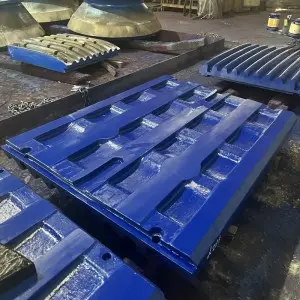A number of factors need to be considered when selecting the material for manufacturing the jaw plate, including the impact force the jaw plate needs to withstand, the hardness and abrasiveness of the material, and cost effectiveness. According to the search results, the following are the most suitable materials for making jaw plates:
High Manganese Steel:
High manganese steel is the traditional material of jaw plate of jaw crusher, which has good impact load resistance and deformation hardening characteristics. Under the action of pressure, high manganese steel can be continuously strengthened, so that it is constantly worn and strengthened in the work until it is worn to the point that it cannot be used.
When the high manganese steel jaw plate is subjected to impact or wear, the deformation induced martensitic transformation of austenite is easy to occur, and the wear resistance is improved.
Medium Manganese Steel:
Medium manganese steel is to reduce the corresponding manganese content in manganese steel alloy, while adding other elements to improve its wear resistance. According to experimental verification, the actual service life of medium manganese steel jaw plate is about 20% higher than that of high manganese steel, and the cost is equivalent to that of high manganese steel.
High Chrome Cast Iron:
High chromium cast iron jaw plate has high wear resistance, but poor toughness. Therefore, some manufacturers will adopt the process of composite jaw plate, combining high chromium cast iron with high manganese steel to maintain high wear resistance while also having good toughness.
Medium Carbon Low Alloy Steel:
Medium carbon low alloy cast steel can be used in a certain range because of its relatively strong hardness and moderate toughness. This material can cope with the conditions of the jaw plate in different working conditions.

Modified high manganese steel:
In order to improve the service life of the jaw plate, a variety of jaw plate materials have been developed, such as adding Cr, Mo, W, Ti, V, Nb and other elements to modify the high manganese steel, and the dispersion strengthening treatment of high manganese steel to improve its initial hardness and yield strength.
Composite materials:
Some jaw plates use composite materials, such as high chromium cast iron and high manganese steel composite material, this jaw plate gives full play to the high wear resistance of high chromium cast iron and high toughness of high manganese steel, so that the service life of the jaw plate has been significantly improved.
When choosing the jaw material, it is necessary to decide according to the specific application scenario and material characteristics. For example, high manganese steel is suitable for most applications, while medium manganese steel is suitable for materials with higher crushing hardness, high chromium cast iron is suitable for applications under extreme wear conditions, and medium carbon low alloy cast steel is suitable for medium wear conditions. Each material has its own unique advantages and limitations, so choosing the most suitable material requires a comprehensive consideration of performance and cost.
Post time: Nov-29-2024
